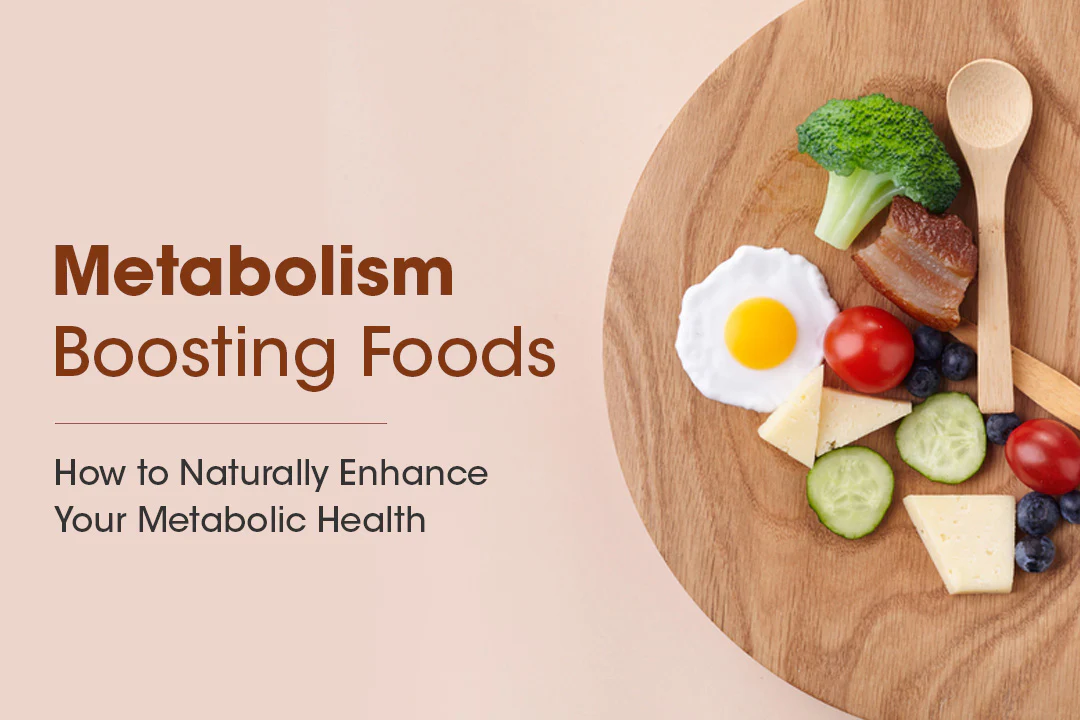
Metabolism Boosting Foods: Fact or Fiction?

Introduction
In the realm of nutrition and weight loss, the notion of “metabolism boosting foods” is one of the most widely accepted and misinterpreted ideas in the world.
New lists of foods that can easily burn fat and increase metabolism appear every year.
But are these claims supported by any real science? Is the idea largely overhyped, or can your diet dramatically increase your metabolic rate and result in long-term fat loss?
We’ll look at what metabolism is, how it functions, and whether certain foods can actually have a significant impact on your caloric burn in this extensive guide.
This article separates fact from fiction, empowers you with evidence-based insights, and exposes the myths that may be holding back your health goals.
Understanding Metabolism
What Is Metabolism?
Metabolism is the term used to describe the chemical processes your body uses to convert food into energy. This energy powers everything from digestion and breathing to exercise and cell repair.
Three main parts make up metabolism:
-
The number of calories your body uses at rest to sustain essential processes like breathing, heart rate, and temperature regulation is known as your basal metabolic rate, or BMR. Between 60 and 75 percent of daily energy expenditure is attributed to BMR.
-
The energy needed to break down, absorb, and metabolize food is known as the Thermic Effect of Food (TEF). Usually, this accounts for around 10% of daily caloric intake.
-
Calories burned during movement, including both exercise and non-exercise activities (NEAT), are measured by activity energy expenditure (AEE).
Why People Want to Boost Their Metabolism
A faster metabolism means more calories burned at rest and during activity, making weight management easier. This is why people are constantly searching for strategies,and foods,that might “boost” metabolic output.
What Are Metabolism Boosting Foods?
“Metabolism boosting foods” refer to ingredients or whole foods that are believed to increase energy expenditure by either:
- Increasing the thermic effect of food
- Stimulating the sympathetic nervous system
- Raising core body temperature
- Enhancing hormonal activity related to fat oxidation
Let’s examine the most commonly mentioned foods and assess the validity of each claim.
Fact or Fiction? Evaluating Popular “Metabolism Boosting” Foods
1. Green Tea – Fact (Partially)
Caffeine and catechins, which are found in green tea, have the ability to promote fat oxidation and thermogenesis.
According to studies, consuming green tea extract can raise daily energy expenditure by 3–4%.
This effect is slight, though, and without additional lifestyle modifications, it might not have a major impact on long-term fat loss.
2. Chili Peppers – Fact (Partially)
Capsaicin, the active compound in spicy peppers, can raise body temperature and temporarily increase calorie burn.
Research findings:
- Small uptick in metabolic rate (around 50 calories per day)
- Appetite suppression in some individuals
But again, the effect is too small to produce significant weight changes unless sustained daily.
3. Protein-Rich Foods – Fact
Protein has a higher thermic effect than fats or carbohydrates. Digesting protein burns 20–30% of its calories, compared to 5–10% for carbs and 0–3% for fat.
Including high-protein foods in your diet:
- Supports lean muscle mass
- Increases TEF
- Enhances satiety
Sources include: Chicken, fish, eggs, tofu, legumes, Greek yogurt.
4. Coffee – Fact (Temporarily)
Caffeine stimulates the nervous system, promoting alertness and fat oxidation.
Studies suggest caffeine can boost metabolic rate by 3–11%, depending on dosage and individual sensitivity.
However, the tolerance builds quickly, reducing long-term effectiveness.
5. Coconut Oil – Fiction (Overstated)
Medium-chain triglycerides (MCTs) in coconut oil are metabolized differently and may slightly increase thermogenesis.
But the hype around coconut oil as a “fat-burning miracle” is not supported by robust evidence.
Overconsumption can lead to excessive calorie intake due to its high energy density.
6. Cold Water – Fact (Marginally)
Drinking cold water may cause your body to expend energy warming it to core temperature. The impact? Around 5–10 extra calories per glass.
While hydrating is essential, drinking cold water will not significantly change your metabolism.
7. Apple Cider Vinegar – Fiction
Apple cider vinegar has been promoted as a weight-loss aid, but no strong evidence shows it boosts metabolism.
It may reduce post-meal blood sugar spikes and appetite in some individuals, but not via metabolic stimulation.
The Science Behind Thermogenesis
What Is the Thermic Effect of Food (TEF)?
Every time you eat, your body expends energy to process it. This is known as the thermic effect of food.
- Protein: 20–30%
- Carbohydrates: 5–10%
- Fats: 0–3%
Eating more protein can subtly raise your daily metabolic rate through TEF while also aiding muscle maintenance.
Role of Brown Fat and Thermogenic Activation
Brown adipose tissue (BAT) burns calories to produce heat, especially in response to cold exposure.
Some foods (like capsaicin and catechins) may stimulate BAT, but their influence is limited in adults and not substantialenough to replace diet and exercise.
What Truly Influences Metabolism Long-Term?
1. Muscle Mass
Muscle is metabolically active tissue. The more muscle you have, the more calories you burn at rest.
Strength training and high-protein diets are the most effective tools for supporting a healthy metabolism.
2. Hormonal Balance
Thyroid hormones (T3 and T4), insulin sensitivity, leptin, and cortisol all impact metabolic function.
Foods can influence these indirectly through blood sugar regulation, gut health, and inflammation control.
3. Sleep Quality
Poor sleep reduces metabolic efficiency, increases cravings, and disrupts hormonal regulation.
Quality sleep supports glucose metabolism, appetite control, and energy balance.
4. NEAT and Movement
Non-exercise activity thermogenesis (NEAT),fidgeting, walking, standing,plays a huge role in daily energy burn.
No food can substitute for an active lifestyle.
The Fiction of a “Magic Food”
Although tempting, the notion that a single food can significantly change your metabolic rate is deceptive. The majority of “metabolism boosting foods” have minor, gradual effects rather than profound ones.
For a metabolic edge, relying only on diet can result in plateaus and frustration.
Building a Metabolism-Supportive Diet
Rather than obsess over metabolism boosters, focus on:
- High protein intake (1.6–2.2 g/kg of body weight)
- Whole, unprocessed foods
- Hydration
- Diverse fiber sources for gut health
- Anti-inflammatory fats (e.g., olive oil, omega-3s)
- Strength training and daily movement
These elements collectively optimize your metabolic efficiency, support fat loss, and improve energy balance.
Expert Consensus: What Science Says
Metabolism Boosters Work,Barely
According to research from the National Institutes of Health (NIH) and studies published in the American Journal of Clinical Nutrition, foods like caffeine and capsaicin may slightly raise metabolic rate.
But the increase is often less than 100 calories per day,easily undone by a handful of extra snacks.
Lifestyle Is King
No food can outpace the effects of:
- Exercise
- Caloric balance
- Sleep
- Hormonal function
Instead of chasing exotic foods, build sustainable habits around diet and movement.
Conclusion
Foods that promise to increase metabolism are both alluring and exaggerated. Although certain components, such as caffeine, green tea, and foods high in protein, do provide slight advantages, the overall impact is negligible and ought to be considered a supplement rather than a tactic.
Pay attention to what really counts if you’re serious about increasing your metabolism and losing fat over the long run:
- Developing lean muscle
- Handling sleep and stress
- Increased movement throughout the day
- Making a whole-food, high-protein, calorie-appropriate diet
That’s the actual recipe for boosting your metabolism.
FAQs – Frequently Asked Questions
These are foods like green tea, chili peppers, and protein that may slightly increase calorie burning.
Yes, but the effect is small and temporary.
Yes, green tea may slightly boost metabolism due to its antioxidants.
Yes, protein needs more energy to digest, which can raise metabolism.
No single food boosts metabolism drastically. A balanced diet and exercise work best.
You may also like
Adding {{itemName}} to cart
Added {{itemName}} to cart




